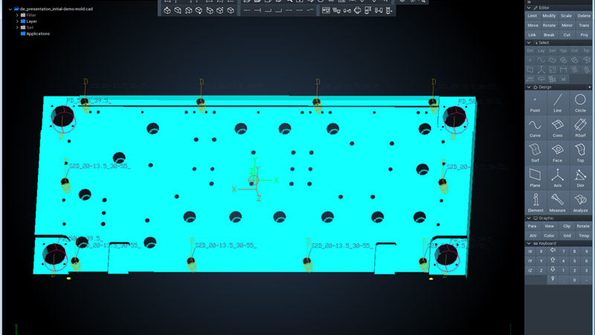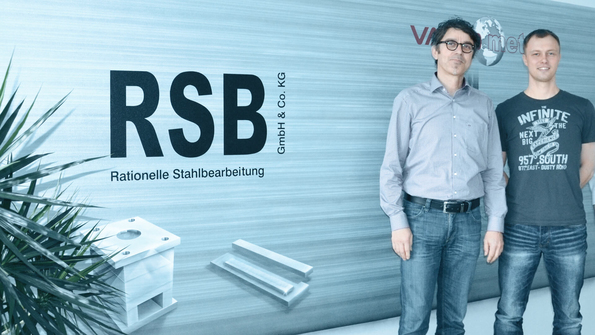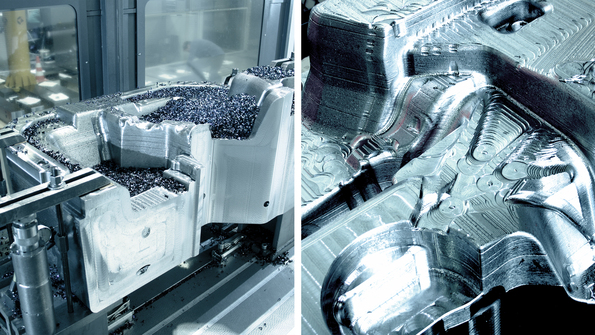-
Software
-
CAM software
- Tebis Automill
- CNC programming
- CNC automation
- CNC simulator
- Multiple setup
- Robotic machining
- CNC drilling
- Deep-hole drilling
- Combined turn-milling
- CNC turning
- Turn-milling
- 2.5D milling
- 3D milling
- 5-axis milling
- Slot milling
- Trimming
- HPC milling
- HFC milling
- Circle-segment cutters
- Sinker EDM
- Wire EDM
- 3D laser cutting
- Laser hardening
- Laser weld cladding
- CAD software
- CAQ software
- MES software
- Products
-
CAM software
- Services
- Consulting
- Sectors
- References
- Company
- News

-
 Home References
Home ReferencesFast and reliable
Since it was founded in 1998, RSB Rationelle Stahlbearbeitung has always approached new market conditions with care and foresight. This medium-sized company in Merkers, Thuringia, has developed from a simple metal cutting operation with inventory management to a comprehensive system provider. It quickly and flexibly supplies the right solution for every customer requirement in die and mold manufacturing and mechanical engineering.
Company
RSB Rationelle Stahlbearbeitung
Location
Merkers, Germany
Focus
Manufacturing of standard die blanks, mold assemblies, die sets and precision flat steels; pre-roughing of mold plates and inserts
Benefits:
- Broad product spectrum
- Single source for squaring, deep-hole drilling and pre-roughing
- Highly automated 2.5D process with Tebis
Sector
Machinery and equipment
Mold manufacturing
Die manufacturing
Published
2016

Interviewee: Thomas Müller, Managing director and company founder
At the end of the day, it's not the least expensive solution, but the most cost-effective one that counts. For software solutions, that clearly means Tebis for us.
Thomas Müller, Managing director and company founder, RSB Rationelle Stahlbearbeitung, Merkers, GermanyOriginally, 10 employees worked on 15 band saws cutting raw materials, primarily for mold manufacturing. By 1999, the Thuringian company had expanded its portfolio with CNC machining. It had also increased its personnel to 70. This enabled company founder Thomas Müller and his team to take over the next step in the process chain: preparing the plate material, milling it cubically, and "getting it ready for machining". The finished product could now be delivered much faster. RSB has continuously expanded its portfolio from then until now.
Broad product spectrum
Customer requirements are currently met by 185 employees in five departments. Services include flame cutting, sawing, flat grinding, 3-, 4- and 5-axis CNC machining, subcontracting, stress-relief heat treatment, welding, blast cleaning and paint coating. In addition, the product spectrum includes the specific production of standard mold and die blanks, mold assemblies, die sets and precision flat steels. Since 2014, RSB has also made a name for itself along with its affiliate, Vario-metall, in pre-roughing of mold plates and inserts. (See inset: Synergy effects in pre-roughing.) Overall, the company anticipates monthly machine run times of roughly 15,000 hours. Twenty-five machine centers of all types and sizes are distributed over a production area of more than 10,000 square meters. Especially remarkable: Only 20 percent of sales are from the production of standard blanks. Far more, roughly 80 percent, is made up by special and individual parts. Manufacturing these parts, which can take on different forms every time, places especially high demands on planning and production.
 Finished part in quality testing (left). Even large, heavy steel components such as this injection molding tool measuring 2,000 x 1,800 x 300 mm, are included in RSB's portfolio (right).
Finished part in quality testing (left). Even large, heavy steel components such as this injection molding tool measuring 2,000 x 1,800 x 300 mm, are included in RSB's portfolio (right).Service oriented
... with outstanding team spirit
Procedures are strictly organized: The sales department checks the inquiry, prepares the order drawing and specifies the individual manufacturing steps. The employees in data management prepare the models for the NC programmers. The NC programmers then send the finished programs to manufacturing with the drawing showing the exact requirements. Everything is set up for maximum efficiency in the machine building as well. Employees attend the machines around the clock in a three-shift operation. RSB emphasizes comprehensive quality assurance: Only one machine operator per shift is responsible for each machine.
A powerful ERP system ensures that all process participants can always see the big picture. Employees also compare the calculated and actual machining times after completing the order.
This enables advance planning of delivery deadlines; every customer can reserve capacity long before actual data entry. A modern online store, with integrated configurator for L-plates and die sets, makes the order process very convenient for customers and dealers. And anyone in need of a quick response doesn't have to wait long: 90 percent of all inquiries are answered on the same day. Sales manager Arno Volkmar says his colleagues are the ones who ensure the company's success. "We could never work so stringently without our highly motivated team," he explains. And personnel turnover is very low. Many former trainees, such as NC programmer Ralf Wünsch, are still working in the company.
Tebis – a die-cast recommendation
The expansion of the product spectrum also increases the demands on the software solutions. Through the years, the topic of 3D milling began to take on greater importance. "At some point we reached a ceiling with our old CAD/CAM software," explains Wünsch. "We had find another solution by 2011 at the latest. At the time, we were milling mold assemblies and mold plates for a larger mold manufacturer. The data volumes were simply too large; some files could no longer even be opened. And if it finally worked, we would barely be able to do the roughing." Wünsch added that, even when it worked, operations would grind to a halt during finishing or earlier. As a result, the customer recommended trying Tebis. RSB ordered a trial installation – and Tebis won the day, not just for 3D milling. Tebis also scored with its solution for automated 2.5D machining. (See inset: full interview with NC programmer Ralf Wünsch and sales manager Arno Volkmar on automated 2.5D machining with Tebis) RSB finally switched over completely to Tebis, operating six workstations in 2012.
We took a closer look at Tebis's automated 2.5D process in a discussion with sales manager Arno Volkmar and NC programmer Ralf Wünsch. Read the complete interview.
 2.5D and 3D programs were generated entirely with Tebis.
2.5D and 3D programs were generated entirely with Tebis.The bottom line after four years – thoroughly positive
Over the course of introducing the new software solution, RSB closely examined the existing processes together with Tebis, and restructured them where necessary. Tebis Consulting participated with a detailed potential analysis. In addition, Tebis implementers helped transform the results of the analysis into simple and clear procedures. "We already benefited greatly just from the restructuring," says Volkmar. "For example, the entire tool inventory was significantly reduced, and is now represented in a virtual library. This lets us use the tools much more efficiently. A large number of individual tools have been replaced with standard tools and just a few special tools.” "We have also revised and simplified the postprocessors. And the integrated template system means we no longer have to spend a lot of time with trial and error in NC programming. We know right away which templates to select for which machining operation," adds Wünsch. Volkmar sees the high degree of process reliability as another positive aspect of Tebis. "Collision checking checks the entire tool and exchanges it automatically if a collision is detected. This allows us to always use the shortest possible tools, which is extremely cost-effective."
Tebis also has a lot to offer as regards performance, surface quality and interfaces. "200-megabyte files open in 15 seconds,” says Wünsch. “The high surface quality is remarkable; there are essentially no more surface defects. And the direct interfaces, for example, to Catia and NX, can be configured individually, and can always be adapted to the customer's special requirements."
 Sales manager Arno Volkmar and NC programmer Ralf Wünsch, both from RSB Rationelle Stahlbearbeitung, and Christian Apel, Tebis AG area sales manager
Sales manager Arno Volkmar and NC programmer Ralf Wünsch, both from RSB Rationelle Stahlbearbeitung, and Christian Apel, Tebis AG area sales managerSynergy effects in pre-roughing
Mold manufacturers looking for a single, reliable source for all steps before heat treatment – squaring, deep-hole drilling and pre-roughing – ,to find it at RSB. Manufacturers can also benefit from RSB's close cooperation with its affiliate VARIO-metall, which started its business in 2007. Like RSB, VARIO-metall was founded by Thomas Müller. VARIO-metall specializes in deep-hole drill machining of mold plates and inserts for plastic and die casting mold manufacturing. It also handles all deep-hole drilling tasks for mechanical engineering. RSB and VARIO-metall complement each other perfectly: Vario-metall performs squaring and deep-hole drilling of the die inserts, and RSB then roughs the components. The fact that both companies share the same site and have the same management ensures short transport and communications paths. This provides substantial economic benefits. "Our customers greatly reduce the load on their own manufacturing capacity, save time and machining expenditures and reduce their transport costs," says Volkmar. This process also provides exceptional component quality. "We mill with a fixed stock allowance, thus ensuring uniform residual stock," Wünsch explains. "The last machining step is performed with a small tool and the largest possible rounding radii, thus avoiding sharp corners. The workpieces are then optimally prepared for subsequent milling." Another advantage is the fast machining. "We use high feed rate cutters, working with a small stepover and high feed rate,” says Wünsch. “Basically, we get everything the machine is capable of."
 Customers benefit from the outstanding interaction of RSB and affiliate VARIO-metall in pre-roughing.
Customers benefit from the outstanding interaction of RSB and affiliate VARIO-metall in pre-roughing.

